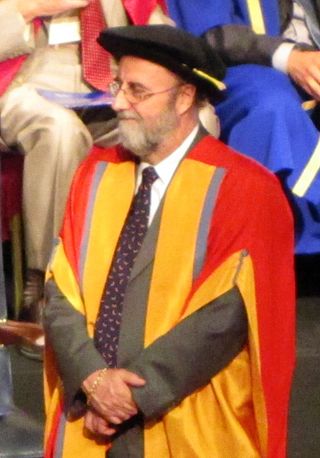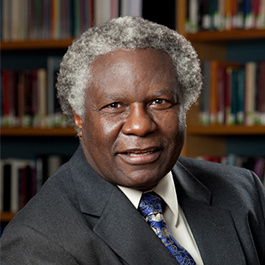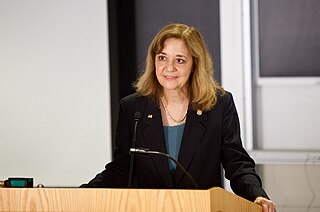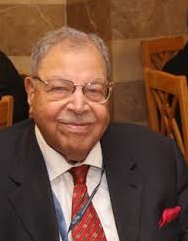
The United Nations Environment Programme (UNEP) is responsible for coordinating responses to environmental issues within the United Nations system. It was established by Maurice Strong,its first director,after the United Nations Conference on the Human Environment in Stockholm in June 1972. Its mandate is to provide leadership,deliver science and develop solutions on a wide range of issues,including climate change,the management of marine and terrestrial ecosystems,and green economic development. The organization also develops international environmental agreements;publishes and promotes environmental science and helps national governments achieve environmental targets.

Sir Robert Tony Watson CMG FRS is a British chemist who has worked on atmospheric science issues including ozone depletion,global warming and paleoclimatology since the 1980s. Most recently,he is lead author of the February 2021 U.N. report Making Peace with Nature.

The Global Environment Facility (GEF) is a multilateral environmental fund that provides grants and blended finance for projects related to biodiversity,climate change,international waters,land degradation,persistent organic pollutants (POPs),mercury,sustainable forest management,food security,and sustainable cities in developing countries and countries with economies in transition. It is the largest source of multilateral funding for biodiversity globally and distributes more than $1 billion a year on average to address inter-related environmental challenges.

Calestous Juma was a Kenyan scientist and academic,specializing in sustainable development. He was named one of the most influential 100 Africans in 2012,2013 and 2014 by the New African magazine. He was Professor of the Practice of International Development and Faculty Chair of the Innovation for Economic Development Executive Program at Harvard Kennedy School. Juma was Director of the School's Science,Technology and Globalization Project at Harvard Kennedy School as well as the Agricultural Innovation in Africa Project funded by the Bill and Melinda Gates Foundation.

Sustainable tourism is a concept that covers the complete tourism experience,including concern for economic,social,and environmental issues as well as attention to improving tourists' experiences and addressing the needs of host communities. Sustainable tourism should embrace concerns for environmental protection,social equity,and the quality of life,cultural diversity,and a dynamic,viable economy delivering jobs and prosperity for all. It has its roots in sustainable development and there can be some confusion as to what "sustainable tourism" means. There is now broad consensus that tourism should be sustainable. In fact,all forms of tourism have the potential to be sustainable if planned,developed and managed properly. Tourist development organizations are promoting sustainable tourism practices in order to mitigate negative effects caused by the growing impact of tourism,for example its environmental impacts.
The World Cities Summit is an international conference series on public governance and the sustainable development of cities.

María Fernanda Espinosa Garcés is an Ecuadorian linguist,poet,politician,and diplomat. She served as an advisor on biodiversity and indigenous peoples (1999-2005) and was the regional director for South America (2005-2007) at the International Union for Conservation of Nature (IUCN). Espinosa Garcés was Ecuador's Minister of Foreign Affairs twice,from 2007 to 2008 and then from 2017 to 2018. She also served as ambassador and permanent representative to the United Nations in New York (2008-2009) and Geneva (2014-2017),and as Ecuador's Minister of National Defense (2012-2014). In June 2018,she was elected President of the United Nations General Assembly for the 73rd session by a two-thirds vote of the member states. Espinosa Garcés became the fourth woman in the seventy-three-year history of the United Nations to be elected President of the General Assembly. Besides her political career,she is also a poet and essayist.
Environmental governance (EG) consists of a system of laws,norms,rules,policies and practices that dictate how the board members of an environment related regulatory body should manage and oversee the affairs of any environment related regulatory body which is responsible for ensuring sustainability (sustainable development) and manage all human activities—political,social and economic. Environmental governance includes government,business and civil society,and emphasizes whole system management. To capture this diverse range of elements,environmental governance often employs alternative systems of governance,for example watershed-based management.

Rosina M. Bierbaum is currently the Roy F. Westin Chair in Natural Economics and Research Professor at the University of Maryland's School of Public Policy. She is also a professor and former dean at the University of Michigan School of Natural Resources and Environment (SNRE). She was hired in October 2001,by then-University of Michigan President,Lee Bollinger. She is also the current Chair of The Scientific and Technical Advisory Panel (STAP) that provides independent scientific and technical advice to the GEF on its policies,strategies,programs,and projects.
Centre for Development,Environment and Policy ("CeDEP"),is a research and teaching centre based in the Department of Development Studies at SOAS University of London. Its teaching programmes are part of the University of London International Programmes,offering distance learning postgraduate qualifications in the subject areas of climate change,sustainability and development. CeDEP's research covers the regions of Asia,Africa and the Middle East placing emphasis on the need for informed professionals with inter-disciplinary skills and understanding to effectively tackle environmental issues,poverty,including their ethical,political,economic,social and technical dimensions. The role of distance learning is highlighted within CeDEP not only as a mode of teaching in the subject areas of climate change and sustainable development,but also as a tool for development keeping in mind that CeDEP's research interests are best addressed and tackled by researchers and students placed in the physical field of their studies in various regions around the world. In addition,CeDEP hosts researchers and candidates for PhD degrees.

Mostafa Kamal Tolba was an Egyptian scientist who served for seventeen years as the executive director of the United Nations Environment Programme (UNEP). In that capacity he led development of the Montreal Protocol,which saved the ozone layer and thus millions of lives from skin cancer and other impacts.

The International Day of Forests was established on the 21st day of March,by resolution of the United Nations General Assembly on November 28,2013. Each year,various events celebrate and raise awareness of the importance of all types of forests,and trees outside forests,for the benefit of current and future generations. Countries are encouraged to undertake efforts to organize local,national,and international activities involving forests and trees,such as tree planting campaigns,on International Day of Forests. The Secretariat of the United Nations Forum on Forests,in collaboration with the Food and Agriculture Organization,facilitates the implementation of such events in collaboration with governments,the Collaborative Partnership on Forests,and international,regional and subregional organizations. International Day of Forests was observed for the first time on March 21,2013.
Safe Planet:the United Nations Campaign for Responsibility on Hazardous Chemicals and Wastes is the UN Environment Programme (UNEP) and UN Food and Agricultural Organization-led global public awareness and outreach campaign for ensuring the safety of human health and the environment against hazardous chemicals and wastes.

The International Resource Panel is a scientific panel of experts that aims to help nations use natural resources sustainably without compromising economic growth and human needs. It provides independent scientific assessments and expert advice on a variety of areas,including:
The Earth Negotiations Bulletin (ENB) is a reporting service providing daily coverage on a variety of global environmental and sustainable development negotiations.

Pavan Sukhdev is an Indian environmental economist whose field of studies include green economy and international finance. He was the Special Adviser and Head of UNEP's Green Economy Initiative,a major UN project suite to demonstrate that greening of economies is not a burden on growth but rather a new engine for growing wealth,increasing decent employment,and reducing persistent poverty. Pavan was also the Study Leader for the ground breaking TEEB study commissioned by G8+5 and hosted by UNEP. Under his leadership,TEEB sized the global problem of biodiversity loss and ecosystem degradation in economic and human welfare terms,and proposed solutions targeted at policy-makers,administrators,businesses and citizens. TEEB presented its widely acclaimed Final Report suite at the UN meeting by Convention on Biological Diversity (CBD) in Nagoya,Japan.

Tan Sri Zakri bin Abdul Hamid has had a distinguished career in science as a researcher,educator,administrator and diplomat.

The contributions of women in climate change have received increasing attention in the early 21st century. Feedback from women and the issues faced by women have been described as "imperative" by the United Nations and "critical" by the Population Reference Bureau. A report by the World Health Organization concluded that incorporating gender-based analysis would "provide more effective climate change mitigation and adaptation."

The effects of climate change on small island countries are affecting people in coastal areas through sea level rise,increasing heavy rain events,tropical cyclones and storm surges. These effects of climate change threaten the existence of many island countries,their peoples and cultures. They also alter ecosystems and natural environments in those countries. Small island developing states (SIDS) are a heterogenous group of countries but many of them are particularly at risk to climate change. Those countries have been quite vocal in calling attention to the challenges they face from climate change. For example,the Maldives and nations of the Caribbean and Pacific Islands are already experiencing considerable impacts of climate change. It is critical for them to implement climate change adaptation measures fast.














